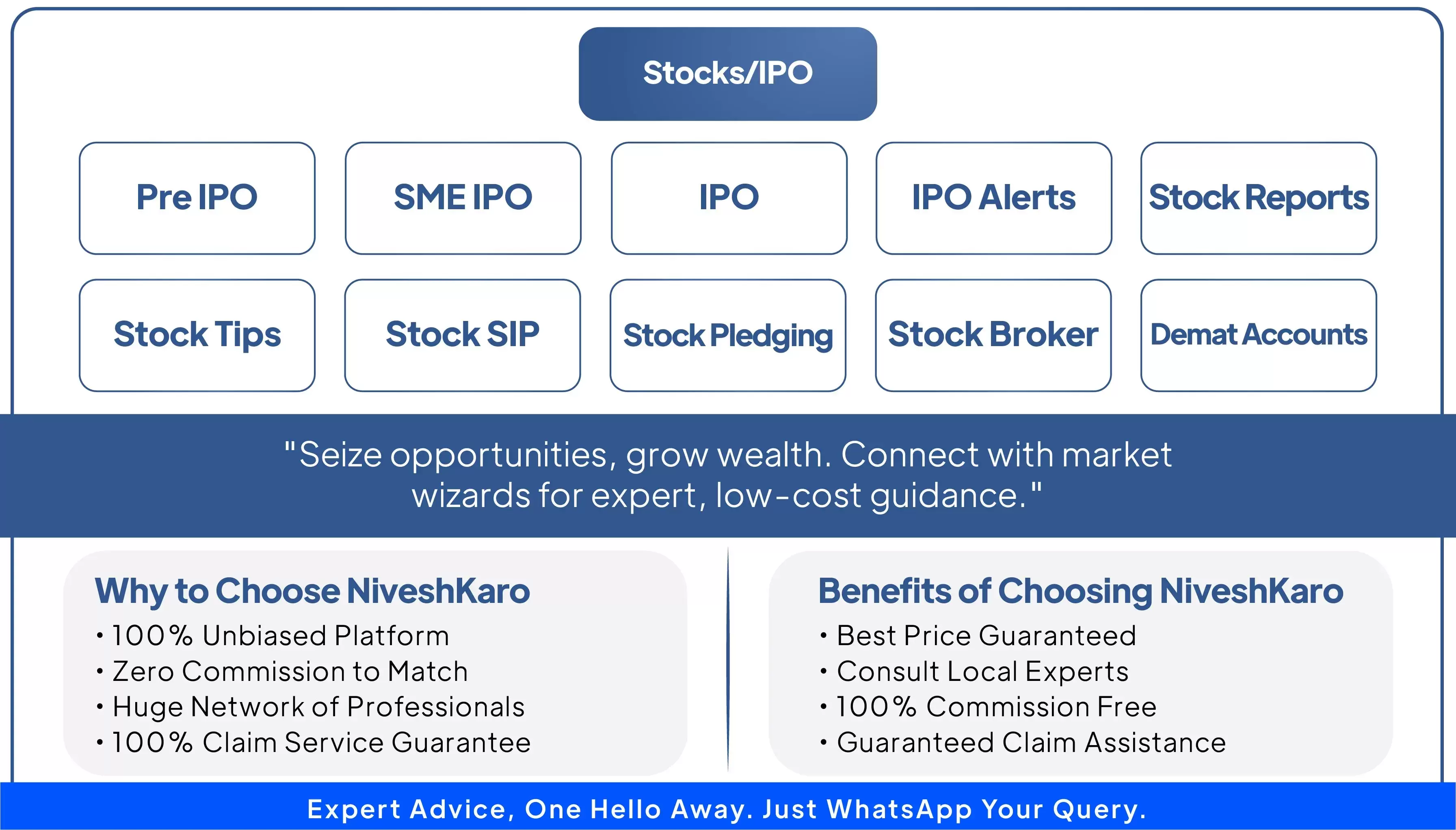- 4B - 48, Fourth Floor, High Street - Highland Corporate Center, Kapurbawadi, Thane (w) 400607
- info@niveshkaro.com

Dreaming of a new home, your child’s education, or a secure retirement? Stocks and IPO investments can turn those dreams into reality. By owning shares in companies or investing in Initial Public Offerings (IPOs), you can grow wealth over time. In 2025, with India’s markets booming, there’s no better time to start! NiveshKaro.com, India’s trusted zero-commission platform, connects you with expert advisors to make smart investment choices. Don’t miss out—act now to seize market opportunities!
What are Stocks & IPO Investments?
Stocks represent ownership in a company, letting you earn profits through price growth or dividends. IPOs are when companies first sell shares to the public, offering early investment opportunities. Investing in stocks or IPOs builds long-term wealth, perfect for Indian investors in cities like Mumbai or Pune.
Types of Stocks & IPO Investments
• Blue-Chip Stocks: Stable, large companies like Reliance or HDFC Bank.
• Growth Stocks: Fast-growing firms, often tech or startups.
• Dividend Stocks: Pay regular income, ideal for retirees.
• Mainboard IPOs: Large companies listing on BSE/NSE.
• SME IPOs: Smaller firms with high-growth potential.
Why Invest in Stocks & IPOs?
With India’s economy thriving and markets seeing Rs.500 crore monthly SIP inflows in 2025, stocks and IPOs offer unmatched growth. They’re crucial for:
• Young Professionals: Build wealth for future goals.
• Families: Fund education or dream purchases.
• Retirees: Generate passive income.
Act Fast: Market trends shift quickly—start investing today!
Benefits of Stocks & IPO Investments
• High Returns: Outpace inflation with 10–15% average annual gains.
• Wealth Creation: Fund life goals like homes or travel.
• Liquidity: Easily buy/sell stocks on exchanges.
• Diversification: Spread risk across sectors.
• Tax Benefits: Long-term capital gains taxed at just 12.5%.
How to Achieve Life Goals with Stocks & IPOs
Use market trends like rising tech stocks or green energy IPOs and strategies like diversification or value investing to meet needs:
• Short-Term: Trade growth stocks for quick gains.
• Long-Term: Invest in blue-chip stocks for stability.
• High-Risk: Bet on SME IPOs for big returns.
When and How to Invest?
Start investing in your 20s for compounding benefits or later for income generation. Open a Demat account at the lowest charges via NiveshKaro’s advisors, who provide regular market updates and guide you on:
• Timing: Buy during market dips or IPO launches.
• Research: Analyze company fundamentals or IPO prospectuses.
Why Choose NiveshKaro.com’s Advisors?
NiveshKaro.com connects you with local certified, authorized brokers and advisors from top firms, ensuring unbiased, need-based stock and IPO plans—not what brokers want to sell. They offer in-person guidance, low-cost Demat accounts, and services like portfolio management, all at India’s best rates. With zero commissions and real-time updates, you stay ahead of market trends.
Benefits of Using NiveshKaro.com
• 100% Free Service: No fees, ever.
• Independent Advice: No firm bias, just your goals.
• Local Expertise: Advisors in Mumbai, Pune, Thane, and Nashik know your market.
• Diverse Options: Access multiple brokers for tailored solutions.
• Trusted Platform: Built for Indian investors’ success.
Why Prefer Local Brokers?
Local brokers offer face-to-face support, unlike online or phone consultants. They simplify Demat account setup, explain IPO application processes, and provide personalized strategies, ensuring trust and clarity.
Don’t Delay: Markets wait for no one—start investing now! Visit NiveshKaro’s Contact page at www.niveshkaro.com and connect with our commission-free local experts who are 100% on your side! Get personalized investment advice tailored to your financial goals, with low-cost services and real-time market insights.





